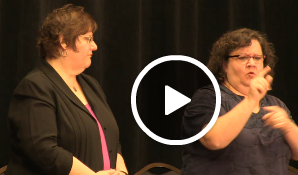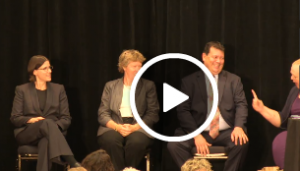
In order to protect their livelihood, sign language interpreters must consider the risks and costs of doing business in a practice profession. Carla Mathers addresses some commonly expressed concerns and considerations to explore.
As we have seen from the discussion of whether sign language interpreters are complicit in the statutory bargain with the devil, interpreters are in a practice profession in which trust, reliability and heart are important attributes. While these characteristics might seem at odds with the concept of running an interpreting practice, there are a number of important considerations for sign language interpreters to weigh when thinking about how best to protect themselves as practitioners. While each state varies in their regulatory environment for small businesses, and this post does not purport to offer legal advice, several general questions should be thought through in establishing and running a practice.
What Risks do I Face?
All businesses face risk of one type or another. Simply stated, risk is the probability of an event happening and an understanding of the event’s consequences. The insurance industry exists to help people minimize the effect of the unforeseen event. There are different types of insurance which should be considered by sign language interpreters. Other than the obvious, health insurance, sign language interpreters most often question whether they need professional indemnity insurance. An interpreter can be sued for malpractice if they undertake an assignment and do not follow the standard of care in performing that assignment. If this breach of the standard of care causes damages to any of the parties, the interpreter can be liable. Professional indemnity insurance covers you in case a judgment is awarded against you.
However, a judgment is not the only risk involved in a professional liability claim. An interpreter should ensure that their legal expenses are covered and this is typically a different policy which covers the litigation costs when either initiating a suit or defending a suit. These are the costs that can truly be devastating to any small business.
Further, it is important to think about what would happen to you and your practice if there were an interruption of your business because of a catastrophic illness or national disaster. Various types of insurance are available such as income protection insurance in the event of illness and business interruption insurance in the case of a disaster which prohibits you from doing business and the resulting loss of income.
Mandatory Reporter
Finally, sign language interpreters working in any setting around children need to know whether they are considered mandatory reporters under the state in which they are working. While all states have laws regarding mandatory reporting, according to the Federal Administration for Families and Children, “[a]pproximately 48 States, the District of Columbia, American Samoa, Guam, the Northern Mariana Islands, Puerto Rico, and the Virgin Islands designate professions whose members are mandated by law to report child maltreatment. Individuals designated as mandatory reporters typically have frequent contact with children.” While sign language interpreters might think this only applies to educational interpreters, some states require reporting from mental health professionals, law enforcement, court appointed special advocates, members of the clergy and domestic violence workers. New Jersey and Wyoming require all persons to report suspected neglect and abuse regardless of profession. Because sign language interpreters, at times, have a somewhat rigid view of their confidentiality mandate, a review of the relevant legal authority in the state in which one works is strongly suggested. A state by state statutory chart is available here and would be a good place to find the statutes applicable in your state(s) of practice.
Do I Need to Incorporate?
The most common forms of business are the sole proprietorship, partnership, corporation, and S corporation and the Limited Liability Company.
Sole Proprietorship
Most sign language interpreters probably function as a sole proprietorship. A sole proprietor is someone who owns an unincorporated business by himself or herself. This form of business organization has many advantages. It is the simplest form of organization because there are no set up costs, no complicated bookkeeping and no separate tax return to be filed for the proprietorship. The income is attributed to the individual and the business expenses are tallied on the individual’s tax return. The dangers of a sole proprietorship derive primarily from the liability of the owner for any of the proprietorship’s debts, including legal judgments.
Limited Liability Company
Another option is the Limited Liability Company, (“LLC”). An LLC is the least complicated and has several advantages. According to the IRS, “A Limited Liability Company is a business structure allowed by state statute. LLCs are popular because, similar to a corporation, owners have limited personal liability for the debts and actions of the LLC. Other features of LLCs are more like a partnership, providing management flexibility and the benefit of pass-through taxation.”
Hence, the LLC’s income is passed through to the individual owner and taxes are paid in the normal course as an individual. The major advantage to the LLC is that liability for the corporate debts, including legal judgments, is limited. The federal government does not recognize an LLC as a classification for federal tax purposes. An LLC business entity must file a corporation, partnership or sole proprietorship tax return.
Corporations
The S and C corporations are more complicated and involve significantly more paperwork and accounting requirements. There may also be state imposed fees annually to maintain the corporation in good standing. Separate tax returns are filed for the corporations and employment taxes must be paid for employees of the corporation. The major advantage is that the owner is not liable for the debts of the corporation, though the downside is that there is double taxation: the corporation must pay taxes on its earnings, and the owner pays taxes on his or her wages.
Again, according to the experts at the IRS, “S corporations are corporations that elect to pass corporate income, losses, deductions and credit through to their shareholders for federal tax purposes. Shareholders of S corporations report the flow-through of income and losses on their personal tax returns and are assessed tax at their individual income tax rates. This allows S corporations to avoid double taxation on the corporate income. S corporations are responsible for tax on certain built-in gains and passive income.”
Traditional corporations are called C corporations. The IRS explains, “[i]n forming a corporation, prospective shareholders exchange money, property, or both, for the corporation’s capital stock. A corporation generally takes the same deductions as a sole proprietorship to figure its taxable income. A corporation can also take special deductions. For federal income tax purposes, a C corporation is recognized as a separate taxpaying entity. A corporation conducts business, realizes net income or loss, pays taxes and distributes profits to shareholders. The profit of a corporation is taxed to the corporation when earned, and then is taxed to the shareholders when distributed as dividends. This creates a double tax. The corporation does not get a tax deduction when it distributes dividends to shareholders. Shareholders cannot deduct any loss of the corporation.”
Employer Identification Number
One of the corporate actions that is beneficial to sign language interpreters, even to sole practitioners, is to obtain a Federal Employer Identification Number (“FEIN”) which can be used on tax returns, contracts, responses to requests for proposals and invoices and which protects the interpreter from having to supply a social security number on these items. A FEIN can be obtained from the IRS website.
Speaking of taxes, as private practitioner, the interpreter should file estimated taxes quarterly on the 15th of January, April, June and September annually. If you are not well schooled in tax preparation, it is a good idea to retain a CPA to assist you in ensuring that your taxes are filed properly.
What Else Should I know?
It is helpful to make sure you obtain contracts for interpreting services in writing. Among other things, those contracts should indicate that you are an independent contractor and not an employee of the hiring entity. Contracts should list your terms or conditions of working, and be tailored to each client and each assignment. Contracts should be read carefully and if particularly complex, the interpreter should consider retaining legal counsel to review and to advise on the documents. Speaking of documents, you should maintain organized business files and keep your records at least seven (7) years.
In some states, you must register to do business if you offer services in the state. In others, sign language interpreters are regulated by a state entity and more defined licensing as an interpreter is required. If you are in a state with a commission, you should consult with its staff on your licensing and registration requirements. In other states, you should contact the executive branch agency responsible for licensing and regulations to determine whether you need a business license or whether you need to register your trade name if you are using a fictitious business name.
There are several good books out there for organizing and running an interpreting practice. I would recommend Tammera J. Richards’ book, Establishing a Freelance Interpretation Business: Professional Guidance for Sign Language Interpreters, currently in its 3rd edition. More information can be obtained at her website.
This post is for informational purposes only and not for the purpose of providing legal advice. You should contact your attorney to obtain advice with respect to any particular issue or problem. Access to this post does not create an attorney-client relationship between the author and the user or browser.


















